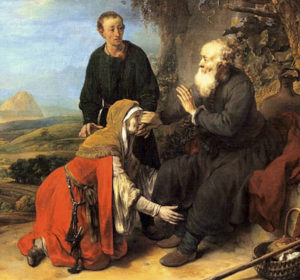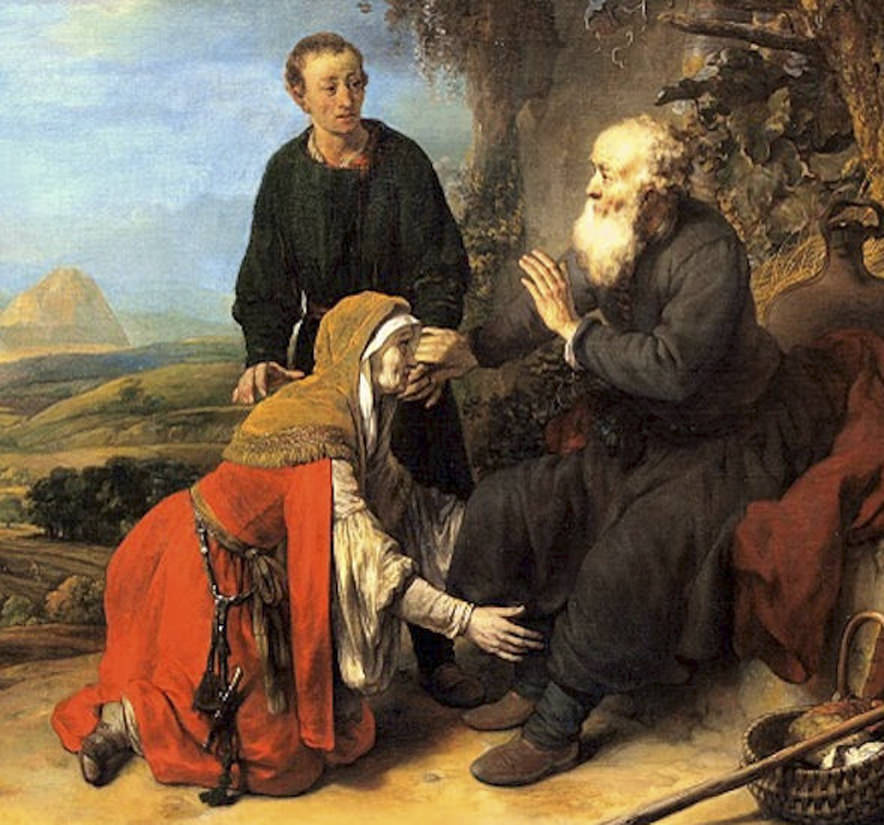
Central idea: The reward for welcoming Christ’s messengers. Doctrine: The family and the kingdom. Practical application: Examination of conscience for one’s two families.
To view the readings for Lectionary 97, click here.
Central idea: The reward for welcoming Christ’s messengers
Reading 1 2 Kgs 4:8-11, 14-16a
One day Elisha came to Shunem,
where there was a woman of influence, who urged him to dine with her.
Afterward, whenever he passed by, he used to stop there to dine.
So she said to her husband, “I know that Elisha is a holy man of God.
Since he visits us often, let us arrange a little room on the roof
and furnish it for him with a bed, table, chair, and lamp,
so that when he comes to us he can stay there.”
Sometime later Elisha arrived and stayed in the room overnight.Later Elisha asked, “Can something be done for her?”
His servant Gehazi answered, “Yes!
She has no son, and her husband is getting on in years.”
Elisha said, “Call her.”
When the woman had been called and stood at the door,
Elisha promised, “This time next year
you will be fondling a baby son.”
- This woman of influence, whose name we do not even know, shows hospitality to Elisha and recognizes that he is, “a holy man of God.” So she welcomes him into her home, even to the point of having her husband prepare “a little room” furnished for him on the roof, the most comfortable place to sleep at night in that hot clime.
- Christ says, “Whoever receives a prophet because he is a prophet will receive a prophet’s reward.” The woman receives Elisha the prophet, “a holy man of God,” and receives the prophet’s reward: through his intercession with God, this woman, who has no son, was blessed with one, a son who will be able to care for her, since “her husband is getting on in years.”
Responsorial Psalm Ps 89:2-3, 16-17, 18-19
R. For ever I will sing the goodness of the Lord.
The promises of the LORD I will sing forever,
through all generations my mouth shall proclaim your faithfulness.
For you have said, “My kindness is established forever;”
in heaven you have confirmed your faithfulness.Blessed the people who know the joyful shout;
in the light of your countenance, O LORD, they walk.
At your name they rejoice all the day,
and through your justice they are exalted.You are the splendor of their strength,
and by your favor our horn is exalted.
For to the LORD belongs our shield,
and the Holy One of Israel, our king.
- God is good, so his messengers bring only good news. Even warnings are good if they are heeded. And even God’s punishments are good because they are just.
- There are many actual good things in this life, but the greatest good is to see God and share in his life.
Reading 2 Rom 6:3-4, 8-11
Brothers and sisters:
Are you unaware that we who were baptized into Christ Jesus
were baptized into his death?
We were indeed buried with him through baptism into death,
so that, just as Christ was raised from the dead
by the glory of the Father,
we too might live in newness of life.If, then, we have died with Christ,
we believe that we shall also live with him.
We know that Christ, raised from the dead, dies no more;
death no longer has power over him.
As to his death, he died to sin once and for all;
as to his life, he lives for God.
Consequently, you too must think of yourselves as dead to sin
and living for God in Christ Jesus.
- For our salvation and sanctification Christ suffered death on the Cross and then arose.
- How do we participate in Christ resurrection and live forever in beatitude?
- The answer is that we, too, must be buried with Christ through baptism—that’s what makes our resurrection possible. But there is more. In this life we must become “dead to sin and living for God in Christ Jesus.”
- This conversion goes against many of our own desires.
- We must not do things we want to do (because they are sinful but attractive).
- And we must do things we don’t want to do (because to live for God in Christ requires an effort).
- This is why Christ will say in our Gospel reading, “whoever does not take up his cross and follow after me is not worthy of me.”
Alleluia 1 Pt 2:9
You are a chosen race, a royal priesthood, a holy nation;
announce the praises of him who called you out of darkness into his wonderful light.
- In Christ, we now belong to a new family or people or race.
- Our new status does not do away with the old but takes it up and perfects it.
- We are now members of the household of God and exalted to a very high degree.
Gospel Mt 10:37-42
Jesus said to his apostles:
“Whoever loves father or mother more than me is not worthy of me,
and whoever loves son or daughter more than me is not worthy of me;
and whoever does not take up his cross
and follow after me is not worthy of me.
Whoever finds his life will lose it,
and whoever loses his life for my sake will find it.“Whoever receives you receives me,
and whoever receives me receives the one who sent me.
Whoever receives a prophet because he is a prophet
will receive a prophet’s reward,
and whoever receives a righteous man
because he is a righteous man
will receive a righteous man’s reward.
And whoever gives only a cup of cold water
to one of these little ones to drink
because the little one is a disciple—
amen, I say to you, he will surely not lose his reward.”
- The original family of God is the inner life of the Blessed Trinity.
- In that image, God created the human family of father, mother, and children.
- Now, Christ creates a new family of God that does not destroy natural human family ties but orders them to the Kingdom of God. Allegiance to Christ comes first so that if there is a conflict between God’s will and one’s own will or the will of another family member, God’s will must come first.
- In God’s new family in this life there is a new economy or order. The Father sends Christ. Christ sends the apostles. And they, in turn, send us. We should welcome ambassadors of Christ. This means showing them hospitality, helping support them within our means, and, above all, listening to them. Christ promises that God will richly reward us for this, as the sonless wife was rewarded by Elisha.
Doctrine: The family and the kingdom
- The Catechism asserts that “family ties are important but not absolute” (CCC 2232).
- The reason for this is our vocation from God: “Just as the child grows to maturity and human and spiritual autonomy, so his unique vocation which comes from God asserts itself more clearly and forcefully” (CCC 2232).
- This is why “Parents should respect this call and encourage their children to follow it. They must be convinced that the first vocation of the Christian is to follow Jesus” (CCC 2232).
- This is the meaning of Christ’s seemingly harsh words: “He who loves father or mother more than me is not worthy of me; and he who loves son or daughter more than me is not worthy of me” (Mt 10:37; cf. 16:25) (CCC 2232).
- Without at all lessening the meaning and importance of the natural human family, Christ inaugurated a new, wider, and higher family, which we join by being disciples of Christ. “Becoming a disciple of Jesus means accepting the invitation to belong to God’s family, to live in conformity with His way of life.” We accept this invitation by doing the will of God. (CCC 2233)
- As Christ put it, “For whoever does the will of my Father in heaven is my brother, and sister, and mother” (Mt 12:49) (CCC 2233).
- This is why, should one of their children have a special vocation to celibacy for the sake of the kingdom of God, “Parents should welcome and respect with joy and thanksgiving the Lord’s call to one of their children to follow him in virginity for the sake of the Kingdom in the consecrated life or in priestly ministry” (CCC 2233).
Practical application: Examination of conscience for one’s two families
- Each believer, then, has two families: one’s natural family and one’s supernatural family.
- Do I honor my human parents and forbears in a way consistent with our ages and states in life?
- This might mean obeying them (if you are young) or taking care of them (if they are old) or praying for them (whether they are living or deceased).
- Do I sincerely love my brothers and sisters with deeds? Charity is not real if it is not shown by actions.
- Do I see that by my baptism I have received a divine adoption so that God the Father is my father, Jesus Christ is my brother, Mary is my mother, Joseph is my foster father, and the rest of my Christian brethren are like mothers, fathers, brothers, and sisters to me as I am to them?
- What can I do today and this week to live better in both my human and my supernatural families?
- What is my divine vocation? Am I taking up my cross daily so as to fulfill it, even though it costs me something?
The Homiletic Directory recommends the following Catechism points and themes for the Thirteenth Sunday in Ordinary Time
- CCC 2232-2233: to follow Christ is first vocation of Christian
- CCC 537, 628, 790, 1213, 1226-1228, 1694: baptism, to die to self, to live for Christ
- CCC 1987: grace justifies through faith and baptism

Leave a Reply